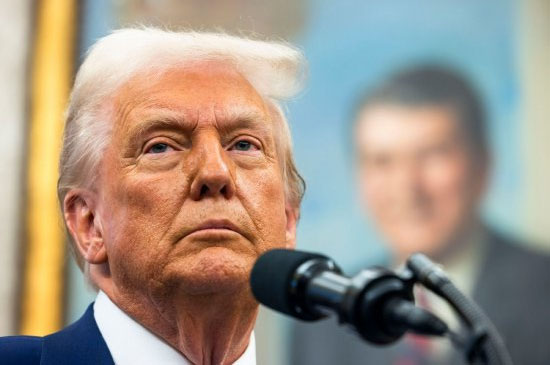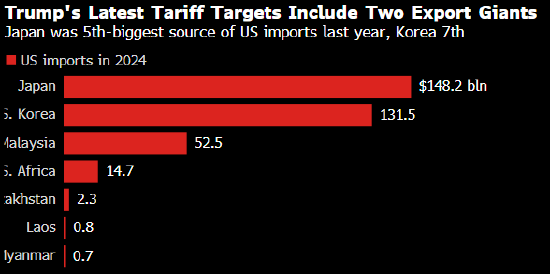US President Donald Trump fulfilled his promise and released the first batch of trade letters, threatening to raise tariffs on multiple trading partners from August 1, with Japanese and Korean goods facing a 25% tariff.

Trump also announced a 25% tariff on Malaysia and Kazakhstan, a 30% tariff on South Africa, and a higher 40% on Laos and Myanmar. He had previously announced that a series of letters and trade agreements would be released on Monday, and these countries eventually became the first targets. According to the deadline originally set by the United States, if countries fail to reach an agreement, they will face the so-called "reciprocal tariffs" announced by Trump on April 2 two days later.
"Unfortunately, our relationship has always been far from equal," Trump wrote in the letter.
After starting his second presidential term, Trump's eagerness to reset US trade policy has brought continued uncertainty to markets, central banks and corporate executives. For them, daily planning is already a challenge, and now they have to assess the impact of Trump's policies on production, inventory, hiring, inflation and consumer demand.
So far, the letters released on Monday seem to be mainly a new approach to postpone the deadline for so-called "reciprocal tariffs" again until at least early August. Most of the tariffs shared by Trump on his Truth Social social media platform are roughly in line with the levels he has announced previously.
About 12 countries will receive tariff notices directly from Trump on Monday, said White House press secretary Carolyn Levitt. She also revealed that more letters will be sent in the coming days.
The development is the latest twist in Trump's tariff plan that has caused turmoil in global markets and trade. A week after announcing the tariffs with great fanfare in the White House Rose Garden in early April, he gave most countries a 90-day reprieve to create conditions for negotiations, during which tariffs were temporarily reduced to 10%.
Few countries have successfully reached agreements in such a short period of time.
Levitt said Trump would sign an executive order later Monday to suspend the new rates until Aug. 1 for all countries facing “reciprocal tariffs.”
Meanwhile, Trump warned countries not to retaliate against his latest move.
“If for any reason you decide to raise tariffs, then whatever number you choose, those numbers will be added to the 25% we are imposing,” he wrote in the letter.

Trump also said the 25% he was referring to did not include any industry-specific tariffs that have been or will be imposed on key imports. Japan and South Korea, both major auto exporters, also face U.S. steel tariffs.
Trump’s letter did offer countries a way to meet his demands. If Japan, South Korea or “companies within your country decide to make or build products in the United States, we will not impose tariffs. In fact, we will make every effort to review and approve them quickly, professionally and routinely — in other words, in a matter of weeks,” he wrote at a press conference.
Asked at a news conference why Trump chose to target Japan and South Korea first, Levitt claimed it was “the prerogative of the president.”
"Those are the countries he chose," she added.
Levitt said the administration is "close" to deals with some other trading partners and said Trump "wants to make sure these are the best deals."
The European Union is not expected to receive Trump's tariff letter today, according to a person familiar with the matter who asked not to be identified.
Levitt said Monday that Trump will "take whatever action is necessary to stop other countries from taking advantage of the United States and our people."
Although Trump claims that foreign countries pay the tariffs, the burden of tariffs actually falls on American importers. They must deal with narrowing profit margins and weigh whether to pass on costs to consumers or to negotiate discounts from foreign suppliers. "All of this new revenue is just a tax on American businesses," Jonathan Gold, vice president of supply chain and customs policy at the National Retail Federation, wrote in a LinkedIn post on Friday.

%20--%3e%3c!DOCTYPE%20svg%20PUBLIC%20'-//W3C//DTD%20SVG%201.1//EN'%20'http://www.w3.org/Graphics/SVG/1.1/DTD/svg11.dtd'%3e%3csvg%20version='1.1'%20id='图层_1'%20xmlns='http://www.w3.org/2000/svg'%20xmlns:xlink='http://www.w3.org/1999/xlink'%20x='0px'%20y='0px'%20width='256px'%20height='256px'%20viewBox='0%200%20256%20256'%20enable-background='new%200%200%20256%20256'%20xml:space='preserve'%3e%3cpath%20fill='%23FFFFFF'%20d='M194.597,24.009h35.292l-77.094,88.082l90.697,119.881h-71.021l-55.607-72.668L53.229,232.01H17.92%20l82.469-94.227L13.349,24.009h72.813l50.286,66.45l58.148-66.469V24.009z%20M182.217,210.889h19.566L75.538,44.014H54.583%20L182.217,210.889z'/%3e%3c/svg%3e)